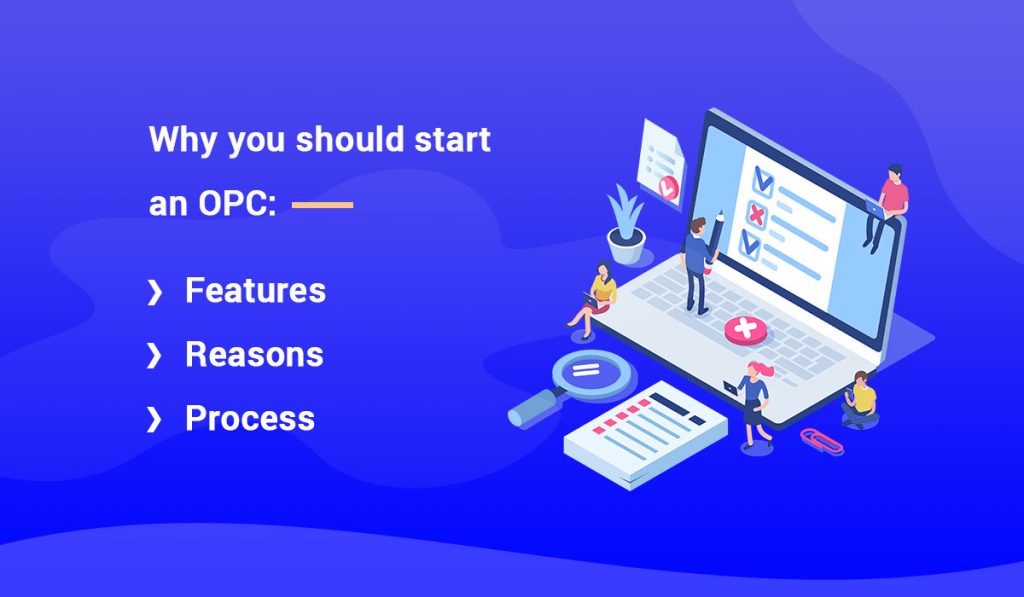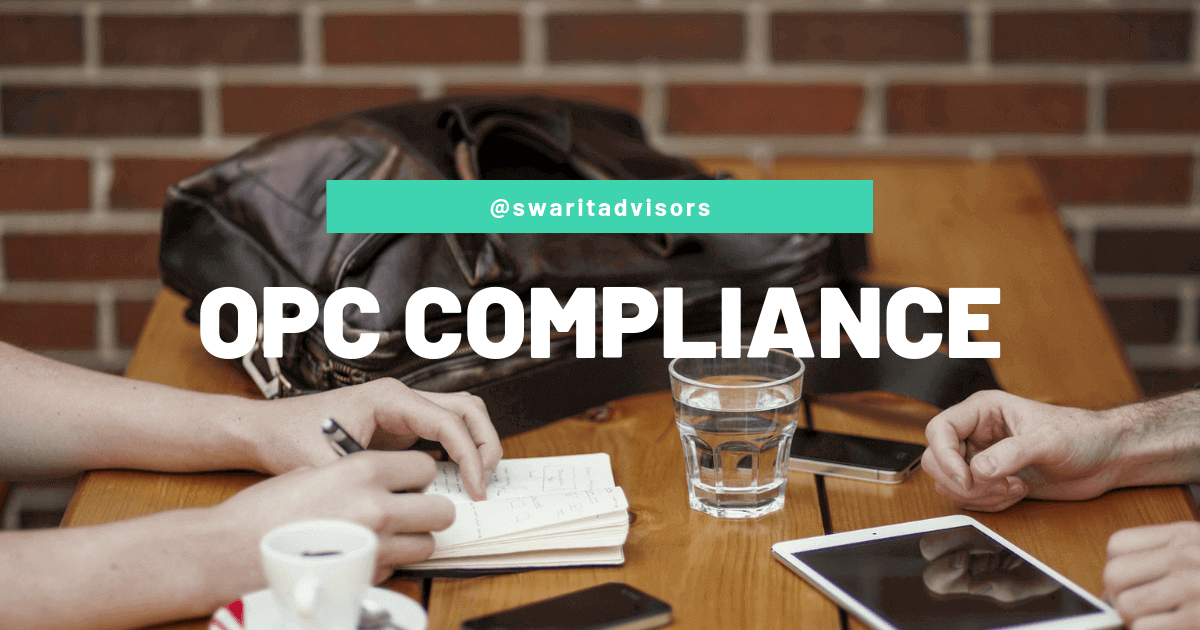Why you should start an One Person Company: Features, Reasons, Process

Khushboo Priya | Updated: Jun 14, 2019 | Category: One Person Company
One Person Company (OPC) came into existence with the sole purpose of encouraging the entrepreneurs to start their own company as a single owner. But you must not confuse it with the Sole Proprietorship.
The fundamental difference between One Person Company and Sole Proprietorship lies in terms of the liability. OPCs have limited liability, whereas, in a proprietorship business, the liability extends to proprietor’s personal assets.
Hence, it would be wiser to choose to start an OPC instead of opting for a sole proprietorship. Apart from this, there are numerous reasons why you should choose One Person Company over others. Let’s discuss several aspects related to OPCs in details-
Table of Contents
What is One Person Company?
Under Section 2 (62) of the Companies Act, 2013, an OPC is defined as a company that consists of only one member. It doesn’t require any co-founder onboard; instead it lets sole entrepreneurs to start the business as Private Limited Company.
Hence, One Person Companies need to comply with every provision as applicable to private companies. This also includes the advantages that private companies get such as limited liability, separate legal identity, etc.
Features of One Person Company in India
- One person company must have a minimum share capital of Rs. 1 lakh.
- According to the Companies Act, 2013, the director of the company should appoint a nominee mandatorily.
- Section 149 (1) (a) of the Act states that the company must hold at least one board meeting in every half of the calendar year.
- One of the most crucial features of One Person Company is that it has only one member as both the shareholder and as director.
- The company is supposed to submit the annual report signed by the Company Secretary (CS). If there’s no CS, then the Director himself is responsible for signing the report.
- According to Section 40 of the Act, cash flow statement isn’t essential for filing the company’s financial statement.
Reasons why startups should start as an OPC
There are plethora of reason why start-ups must choose an OPC over sole proprietorship or other business forms. Some of them are as follows:
- Limited Liability: In case of any mishappenings, the owner won’t need to incur the loss. Furthermore, there his personal assets won’t be at any risk.
- Perpetual Succession: Entity will continue its existence irrespective of whatever incidents occur.
- Independent Existence: Even if the owner dies, the company will continue its existence as there’s a nominee.
- Separate legal entity: OPC is a separate legal entity from its member.
- No share transfer: As there’s only member in the company who acts both as the director and shareholder of the company, therefore, there can’t be any transfer of shares.
Difference between an OPC and Sole Proprietorship
One Person Company is completely different from the Sole Proprietorship business forms. The distinction between the two is as follows:
| Features | One Person Company | Sole Proprietorship |
| Registration | Mandatory under the Companies Act, 2013 | Not mandatory |
| Legal status | Separate legal entity | Not a separate legal entity |
| Liability of the member | Limited liability | Unlimited liability |
| Maximum no. of member | Minimum one person (but a nominee is mandatory) | 1 (sole owner) |
| Minimum no. of member | 2 persons (Director and the nominee) | 1 person |
| Transferability | Allowed to only nominee | Not allowed |
| Foreign ownership | Allowed | Not allowed |
| Taxation | Tax rate is employed at 30% on the total income or profit | Taxed as an individual |
| Annual filings | Needs to file several annual returns with the ROC | Only needs to file Income Tax Returns |
| Survival | Continues even after the death of the director as there’s a nominee | Survival ends with the death or retirement of the member |
How to Start an OPC in India?
As of now, you might have understood that One Person Company is one of the best choices for those who don’t want any interference of others. So, what is the process of incorporating an OPC in India?
Below we have enlisted the steps required to obtain OPC registration in India:
Step 1: Apply for DSC (Digital Signature Certificate)
Firstly, you are required to obtain a DSC from the concerned authority by filing the application to the MCA (Ministry of Corporate Affairs).
Step 2: Company’s name approval through RUN
Secondly, get your company’s name approved through RUN (Reserve Unique Name) Service.
Step 3: File SPICe or INC-32 Form
You need to attach all the documents as described below along with the SPICe form.
- Copy of PAN;
- Copy of Voter card or passport or driving license, etc.;
- Passport-sized photograph;
- Latest bank statement or telephone bill;
- MOA (Memorandum of Association0 & AOA (Articles of Association) of the company;
- Copy of sale deed or property deed (if you have owned property);
- Copy of Rent Agreement;
- NOC (No-Objection Certificate) from the property owner (if rented);
- Other documents as required.
Upload all these documents on the MCA’s website along with the DSCs of the Director. With SPICe, you are also supposed to file for DIN (Director Identification Number). The ROC (Registrar of Companies) will provide with PAN & TAN of the company, DIN, etc.
Step 4: The Certificate of Incorporation of an OPC
The Registrar of Companies will inspect the documents and application carefully. If he is contended with them, he will issue the Certificate of Incorporation. You can download the Certificate of Registration from the MCA’s website.
Furthermore, you will receive the CIN (Corporate Identity Number) from the ROC.
Concluding Remarks
One Person Company is probably the best option for anybody who wishes to start the business as a sole owner. The reason for the same is the several advantages this business structure offers, one of which is a limited liability.
Likewise, there are multiple other reasons why you should choose OPC business form as a start-up. Therefore, now that you are aware of the benefits of OPCs over Sole Proprietorship, you can start your own One Person Company and be the only owner.
In case you have any further queries, contact Swarit Advisors. We are trusted and known to provide the fastest registration, that too at nominal charges.














